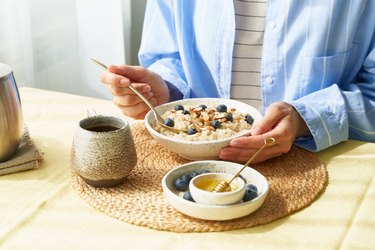
While on its own oatmeal offers hearty whole grains, B vitamins, essential minerals and filling fiber, simply adding this one low-calorie, antioxidant-abundant beverage can bump up its nutrient profile (and flavor factor) by leaps and bounds.
Not just for sipping, tea is the incredible ingredient that'll infuse your oats with oodles of oomph. Just when you thought your morning oats couldn't get any healthier!
Video of the Day
Video of the Day
How to Cook Oatmeal in Tea
While you normally make your oats with boiling water, simply cook them in a boiling pot of tea instead, says Frances Largeman-Roth, RDN, author of Smoothies & Juices: Prevention Healing Kitchen: 100+ Delicious Recipes for Optimal Wellness.
First, decide what type of oats you want to use — choose from steel-cut, rolled oats or instant oats. Then, follow the cooking instructions on the back of the package for the correct ratio of oats to water.
- Bring the water to a boil
- Add a tea bag (or two, if you want more flavor and caffeine) and steep for a few minutes
- Remove the bags, stir in your oats, heating as usual and voila — tea-infused oats!
What Types of Tea Work Best With Oatmeal?
Any tea that comes in a bag is fair game.
"I wouldn't use loose-leaf tea because it's too much of a chore to brew the tea and then remove the loose tea before adding the oats to the water," Largeman-Roth says.
In terms of flavor, the following teas would all add a lovely infusion to the oats:
- Chai
- Earl Grey
- Rooibos
Ground matcha tea might also make a nice match, but measuring out the right amount could be tricky. If you unintentionally add too much matcha, you might get more caffeine than you bargained for, Largeman-Roth says.
How Much Caffeine Is Too Much?
A maximum of 400 milligrams of caffeine a day should be safe, per the Food and Drug Administration (FDA). For reference, a cup of tea usually has 19 to 47 milligrams per cup, according to the Mayo Clinic.
But if you’re sensitive to caffeine, pregnant, breastfeeding or taking certain medications, consult with a medical professional and consider limiting your caffeine intake.
The Benefits of Cooking Oatmeal in Tea
The best benefit of blending tea with oats is the antioxidant boost, Largeman-Roth says.
That's because teas contain powerful polyphenols, which are antioxidants that help mitigate the effect of dangerous free radicals in the body and may reduce your risk of certain diseases, according to the Harvard T.H. Chan School of Public Health.
The caffeine buzz is another plus. Depending on the type of tea you use, tea-infused oats can offer a caffeine kick on par with your daily cup of coffee, Largeman-Roth says.
"It's just like when you use cold brew to make overnight oats — the oats absorb the tea, so you're getting all the caffeine that you would if you drank a cup of tea."
Tip
When you need a heavy-duty morning pick-me-up, steep your oats in green and black teas. An 8-ounce cup of either will provide 30 to 50 milligrams of caffeine, per the FDA.
Not a caffeine fan? Simply use an herbal tea or a caffeine-free variety, Largeman-Roth says.
Either way, cooking your oats with tea transforms a boring old bowl of oatmeal into a brand-new breakfast dish, adding flavor without extra calories. "It's like infusing your water with lemon — it really changes the game," Largeman-Roth says.
Was this article helpful?
150 Characters Max
0/150
Thank you for sharing!
Thank you for your feedback!